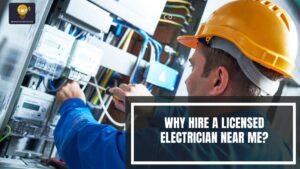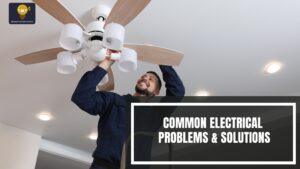Is It Time to Upgrade? Everything You Need to Know About Upgrading Electrical Panels
Electricity powers nearly every aspect of modern life, from the refrigerator storing your groceries to the devices keeping you connected. Yet, many homeowners overlook the importance of maintaining their home’s electrical infrastructure. One of the most critical yet often ignored components is the electrical panel. If your home still relies on an outdated panel, upgrading electrical panel could protect your family, prevent costly outages, and even increase your home’s value.
Why Electrical Panels Matter More Than You Think
An electrical panel (also known as a breaker box or distribution board) is the control center for all the electricity flowing through your home. It routes electricity to various circuits and helps prevent overloads and fire risks by tripping breakers when necessary. Over time, especially in older homes, these panels may no longer meet the power demands of today’s technology driven lifestyles. Upgrading electrical panel systems becomes essential as homes built decades ago weren’t designed for electric vehicles, smart appliances, or multi-device households. If you’re constantly resetting breakers or noticing flickering lights, your system might be crying out for an upgrade.
Signs You Might Need to Upgrade Your Electrical Panel
Recognising when your system needs attention can help prevent dangerous situations. Here are a few signs you should consider upgrading your electrical panel:
- Frequent breaker trips: If your breakers trip often, it’s a strong signal that your panel is overloaded.
- Flickering or dimming lights: Lights that dim when major appliances start suggest your system is overtaxed.
- Two-pronged outlets or a lack of GFCIs: These are signs your home may still have outdated electrical systems.
- You still have a fuse box: Fuse boxes are antiquated and not suitable for modern electric loads.
- Burning smells or warm panel surfaces: These are emergency warning signs that require immediate attention.
What Does Upgrading Your Electrical Panel Involve?
Upgrading an electrical panel typically involves replacing the existing panel with a new one that provides more amperage and supports modern safety features. Most modern homes require a 200-amp panel, especially if you’re adding new appliances, installing central HVAC systems, or planning a home addition.
Here’s what the process usually includes:
- Inspection: An electrician assesses your current setup and power usage.
- Planning: Permits and code compliance are reviewed.
- Installation: The old panel is removed and replaced with a new one.
- Testing and labeling: Each circuit is tested and clearly labeled for future safety.
Benefits of Upgrading Your Electrical Panel
The advantages go beyond just keeping the lights on. Here’s what you gain:
1. Improved Electrical Safety
A newer panel reduces the risk of electrical fires, shocks, and other hazards. Outdated panels may lack safety features like AFCI and GFCI protection, which are standard in modern systems.
2. Increased Home Value
Many prospective buyers consider upgrading electrical panel work a value-add. A modern electrical system offers peace of mind, which can make your home more appealing to buyers.
3. Support for Modern Devices
Smart homes, EV chargers, induction cooktops, and powerful HVAC units all require more power. A new panel ensures your system can handle those demands.
4. Fewer Power Interruptions
Tired of your breaker tripping when you run the microwave and the toaster at the same time? A panel upgrade balances load better and reduces these interruptions.
5. Easier Future Upgrades
Once your panel is modernized, it’s easier (and cheaper) to add new circuits or technology down the line.
The Role of General Electrical Repairs
While a panel upgrade is a major electrical project, many homes also require general electrical repairs to operate safely. Aging wires, corroded terminals, and outdated outlets are common issues. Even a perfect panel can’t compensate for faulty wiring elsewhere.
Here are some common electrical repairs homeowners face:
- Replacing worn-out outlets and switches
- Fixing short circuits or dead outlets
- Rewiring light fixtures or fans
- Updating aluminum wiring
- Installing GFCI and AFCI outlets in wet or high-risk areas
It’s a good idea to bundle a panel upgrade with a comprehensive electrical inspection to catch and address these smaller but important fixes.
Upgrading Electrical Panels vs. Repairing Panels: What’s the Difference?
Some homeowners assume that a quick fix will do the trick. While electrical repairs can resolve minor issues like loose connections or faulty breakers, they won’t solve structural limitations. Here’s when an upgrade is the better choice:
- The panel is more than 25-30 years old
- You’re planning a major renovation
- You’re installing high-powered appliances
- The panel shows signs of heat damage or corrosion
A skilled electrician will let you know whether repair or full replacement is the smarter long-term move.
Electric Service Upgrades: What They Mean
Sometimes, upgrading electrical panel isn’t enough, especially in older neighborhoods with outdated utility connections. That’s when you’ll hear about electric service upgrades.
Electric service refers to the power provided by your utility company. If your existing service only supplies 100 amps, installing a 200-amp panel won’t help unless the service itself is upgraded. A full electric service upgrade may involve:
- New service drop (wires from utility pole to house)
- New meter base
- Upgraded weather head
- Service entrance cable replacement
This work requires coordination with the utility provider and strict compliance with local codes. It’s not a DIY job and must be handled by a licensed electrician.
Why You Should Always Hire a Licensed Electrician
Electricity is unforgiving. Faulty panel installations or repairs can cause fires, injuries, or death. That’s why electrical work should never be taken lightly. Licensed professionals ensure:
- Code-compliant work
- Proper permitting
- Safety for your household and property
- Valid insurance coverage in case of accident or damage
DIY work or hiring unlicensed workers may save money in the short term but can result in fines, failed inspections, or worse.
Planning for the Future: When to Consider a Panel Upgrade
Even if you’re not experiencing obvious electrical issues, it’s smart to consider upgrading your electrical panel if:
- You plan to buy an electric car
- You’re remodeling your kitchen or adding square footage
- You want to install solar panels
- You’re adding a home office with multiple devices
- Your energy bills are unusually high due to inefficient systems
Modernizing your electrical system is about future-proofing your home. As energy usage continues to rise, homes with outdated systems will increasingly struggle to keep up.
Conclusion
Upgrading electrical panel systems is essential for keeping up with the increasing power demands of today’s homes. Whether you’re adding new appliances or simply aiming to improve safety, a modern panel provides better efficiency and protection. Pairing this with an electric service upgrade ensures your entire electrical system can handle future growth. Don’t wait for issues to arise stay ahead with a proactive approach that safeguards your home and supports your lifestyle for years to come.
If your home still runs on an outdated system, don’t wait for a blown fuse or worse. Schedule a professional inspection and start planning your upgrade today.



